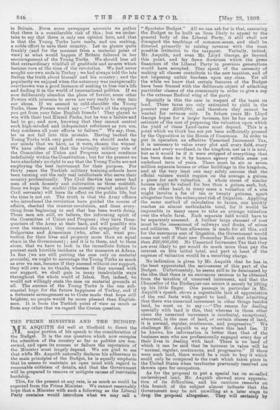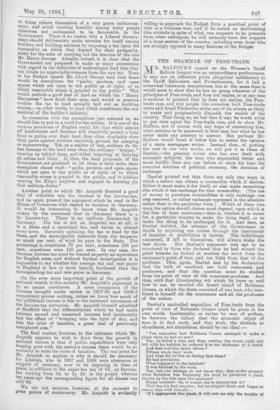THE PRIME MINISTER AND THE BUDGET.
AIR. ASQUITH did well at Sheffield to direct the major portion of his speech to the consideration of the Budget. It is the one question which now occupies the attention of the country so far as politics are con- cerned, and upon its success or failure the reputation of the Ministry must largely depend. We are glad to see that while Mr. Asquith naturally declares his adherence to the main principles of the Budget, he is equally emphatic that he means to maintain an open mind with regard to reasonable criticism of details, and that the Government will be prepared to remove or mitigate causes of inevitable hardship.
This, for the present at any rate, is as much as could be expected from the Prime Minister. We cannot reasonably hope that a Minister with such a following as the Liberal Party contains would introduce what we may call a " Spectator Budget." All we can ask for is that, assuming the Budget to be built on lines likely to appeal to the general body of the Liberal Party, it still shall not disregard the teachings of common-sense, and shall be directed primarily to raising revenue with the least possible irritation to the taxpayer. Verbally, indeed, Mr. Asquith, and even Mr. Lloyd George, go beyond this point, and lay down doctrines which the great financiers of the Liberal Party in previous generations would have accepted. They speak of the necessity of making all classes contribute to the new taxation, and of not imposing unfair burdens upon any class. Yet all the while we know that certain features of the Budget have been framed with the deliberate object of attacking particular classes of the community in order to give a sop to the extreme Radical wing of the party.
Specially is this the case in respect of the taxes on land. These taxes are only estimated to yield in the present year £500,000, and therefore they cannot be wanted for revenue only. In future years Mr. Lloyd George hopes for a larger increase, but he has made no estimate of the cost of preparing the valuation upon which the yield of these Laud-taxes must depend. This is a point which we think has not yet been sufficiently pressed. by the Opposition in the House of Commons. In order to put in operation an effective Unearned Increment Tax, it is necessary to value every plot and every field, every mine and every woodland, in the kingdom, not as it is now, but as it would be if it were stripped of everything that has been done to it by human agency within some yet undefined term of years. There must be six or seven million separate houses or other buildings in the kingdom, and at the very least one may safely assume that the official valuers would require on the average a guinea a piece for each valuation. A whole street of similar houses might be valued for less than a guinea each, but, on the other hand, in many cases a valuation of a site might involve a fee of ten or twenty guineas, apart altogether from the subsequent risk of litigation. Applying the same method of calculation to farms, one quickly reaches an almost unthinkable total, for it would be impossible in many cases to take an average valuation over the whole farm. Each separate field would have to be separately assessed. A further large element of cost must be the assessment of railways and docks, of mines and collieries. When allowance is made for all this, and for the enormous cost of litigation, the Government would come out well if their new Domesday Book cost them less than £20,000,000. No Unearned Increment Tax that they are ever likely to get would do much more than pay the interest on this initial total, and part at least of the expense of valuation would be a recurring charge.
No indication is given by Mr. Asquith that he has in the least appreciated the seriousness of this part of the Budget. Unfortunately, he seems still to be dominated by the idea that there is an enormous revenue to be obtained from the taxation of unearned increment, and that the Chancellor of the Exchequer can secure it merely by lifting up his little finger. One passage in particular in Mr. Asquith's speech shows a regrettable lack of appreciation of the real facts with regard to land. After admitting that there was unearned increment in other things besides land, he went on to say :—" The reason for dealing specially with land is this, that whereas in those other cases the unearned increment is incidental, exceptional, abnormal, in the case of laud, or certain classes of land, it is normal, regular, continuous, and progressive," We challenge Mr. Asquith to say where this land lies. If he knows, his information is better than that of the business men who are professionally engaged every day of their lives in dealing with land. There is no land of which it can be said that its increase in value will be " normal, regular, continuous, and progressive." If there were such land, there would be a rush to buy it which could only be compared to the rush which takes place in the United States when territories previously reserved are thrown open for occupation.
As for the proposal to put a special tax on so-called undeveloped land, Mr. Asquith showed more apprecia- tion of its difficulties, and his cautious remarks on this branch of the subject almost indicate that the Government may be not unwilling at a, later stage to drop the proposal altogether. They will certainly by so doing relieve themselves of a very grave embarrass- ment, and avoid creating hostility among many people otherwise not undisposed to be favourable to the Government. There is no reason why a Liberal Govern- ment should deliberately make enemies for itself among builders and building societies by imposing a tax upon the commodity on which they depend for their prosperity, solely for the sake of carrying out the theories of the late Mr. Henry George. Already, indeed, it is clear that the Government are prepared to make so many concessions with regard to the definition of undeveloped land that they can obtain no appreciable revenue from the now tax. Even in his Budget speech Mr. Lloyd George said that there would be exemptions for "parks, gardens, and open spaces which are open to the public as of right, or to which reasonable access is granted to the public." This would exclude a good deal of land on which the " Henry Georgeites" have fixed their eyes, and would in practice confine the tax to land actually laid out as building estates,—in other words, to land which constitutes the raw material of the builder's industry.
In connexion with the exemptions just referred to, we should like to put in a word for the soldier. It is one of the curious paradoxes of English social life that while almost all landowners and farmers will cheerfully permit a local hunt to gallop over their land, they often churlishly close their gates against soldiers requiring ground for camping or manceuvring. Yet, as a matter of fact, soldiers do far lees damage to the land even than the ordinary "tripper," clearing up behind them, and either removing or burying all refuse and litter. If, then, the laud proposals of the Government are persisted in, let them at least make their exemption clause read: "parks, gardens, and open spaces which are open to the public as of right, or to which reasonable access is granted to the public, and to soldiers wearing the King's uniform and engaged in training for their military duties."
Another point to which Mr. Asquith directed a good deal of attention was the increase in the Income-tax, and lie again pressed the argument which he used in the House of Commons with regard to taxation in Germany. It would be interesting to know what Mr. Asquith means by the statement that in Germany there is a 2s. Income-tax. There is no uniform Income-tax in Germany. The tax is not an Imperial tax at all; it le a State and a municipal tax, and varies in almost every town. Generally speaking, the tax is fixed by the State, and the municipality demands from the taxpayer so much per cent. of what he pays to the State. The percentage is sometimes 70 per cent., sometimes 100 per cent„ sometimes even 150 per cent. In any case, the German Income-tax must be treated as partly an equivalent for English rates, and without further investigation it is impossible to say whether the average tax and rate payer in England is less or more heavily burdened than the corresponding tax and rate payer in Germany, On the even more important point of the growth of national wealth in this country Mr. Asquith's argument is by no means conclusive. A mere comparison of the incomes brought under review in 1897-98 and 1908-9 respectively proves nothing, unless we know how much of the additional income is due to the increased astuteness of the Income-tax surveyors. Mr. Asquith himself admitted at Sheffield that the differentiation which he had made between earned and unearned incomes had incidentally had the effect of " bringing into the light of day, and into the orbit of taxation, a great deal of previously unexplored area."
The final answer, however, to the inference which Mr. Asquith appears to wish to draw from the growth in national income is that if public expenditure were only keeping pace with the nation's income there would be no necessity to raise the rates of taxation. The real point for Mr. Asquith to explain is why it should be necessary for Liberals, who in 1897 and 1898 were strenuous in support of economy, now to be imposing in time of peace, in addition to the super-tax tax of 6d., an Income- tax varying from 9d. to Is. 2d. in the pound, whereas ten years ago the corresponding figure for all classes was only gd.
We are not anxious, however, at the moment to press points of controversy. Mr. Asquith is evidently willing to approach the Budget from a practical point of view as a business man, and if he insists on maintaining this attitude in spite of what one suspects to be pressure from other colleagues, he will certainly have the support of a large section of the country, including even those who are strongly opposed to many features of the Budget.







































 Previous page
Previous page